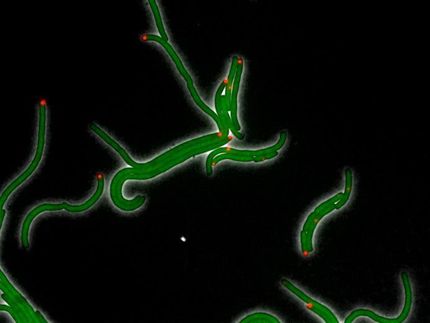Sex matters for microbes
Caught in the act! Researchers from the University of Bristol have observed mating for the first time in the microbes responsible for African sleeping sickness. This tropical disease is caused by trypanosomes, single-celled parasites that are found in the blood of those afflicted.
The Bristol team were able to see what the trypanosomes were getting up to inside the tsetse flies that carry the disease by using fluorescent markers [see image – link below]. The microscopic beasts were seen twirling and gyrating together before joining up into one hybrid cell. To tell which was which, individual trypanosomes were tagged with different colours, with the result that the hybrid cells had both colours.
Professor Wendy Gibson, who led the research, commented: "It's not only bigger animals that have intricate courtship – but you need a powerful microscope to see this!"
Sex matters for microbes because it enables genes to be swapped between different strains, leading to new combinations of genes. In the case of disease-causing microbes like the trypanosome, sex can potentially lead to a lot of harmful genes being combined in one strain. These new results suggest that sex is not an optional or rare part of this microbe's life cycle, but probably happens every time two different trypanosomes find themselves together in the same tsetse fly.
Trypanosomes belong to a strange group of protozoa that includes several other medically important parasites such as Leishmania, Trichomonas and Giardia. In the past, all these microbes were thought to reproduce just by splitting in half, but now results show that they also use sex to swap genes between strains. This research helps scientists understand how new strains of disease-causing microbes arise and how characteristics such as drug resistance get spread between different strains.
Organizations
Other news from the department science

Get the life science industry in your inbox
By submitting this form you agree that LUMITOS AG will send you the newsletter(s) selected above by email. Your data will not be passed on to third parties. Your data will be stored and processed in accordance with our data protection regulations. LUMITOS may contact you by email for the purpose of advertising or market and opinion surveys. You can revoke your consent at any time without giving reasons to LUMITOS AG, Ernst-Augustin-Str. 2, 12489 Berlin, Germany or by e-mail at revoke@lumitos.com with effect for the future. In addition, each email contains a link to unsubscribe from the corresponding newsletter.



















































